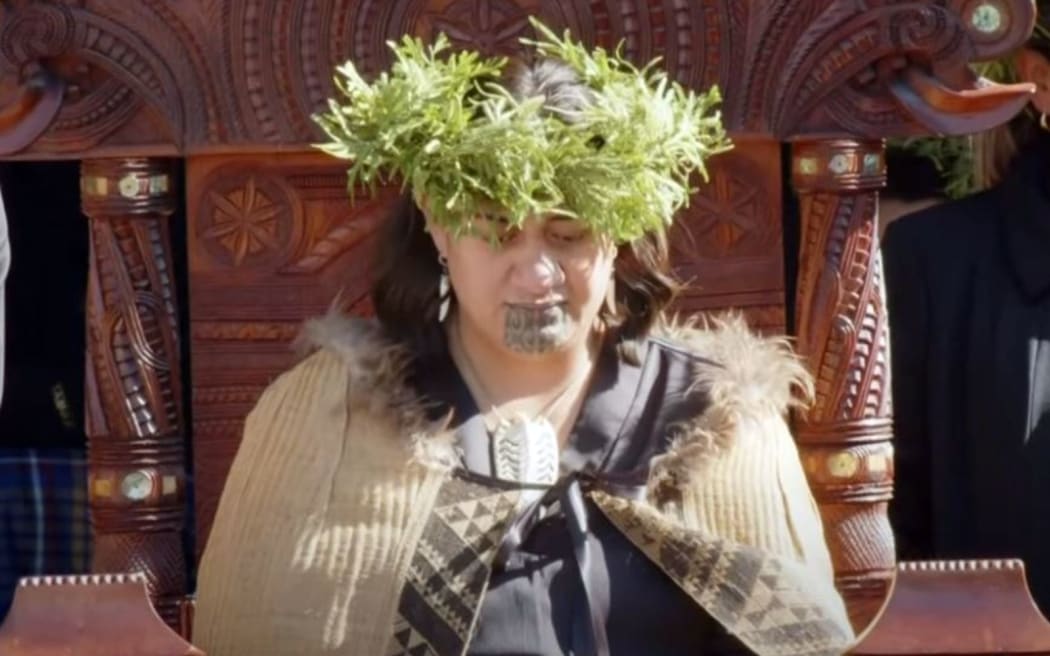Politics
Young Māori Reflect on Significance of Māori Queen’s Legacy

On a misty spring morning in March 2023, thousands gathered at Tuurangawaewae Marae in Ngaaruawaahia, Waikato, to pay their respects to the late Māori King, Kiingi Tuheitia Pootatau te Wherowhero VII. The occasion marked the significant transition of leadership within the Māori monarchy, culminating in the announcement of his successor, Te Arikinui Kuini Nga wai hono i te po, the king’s only daughter and youngest child. This week, the Kiingitanga commemorates the first anniversary of this pivotal event with the annual Koroneihana celebration, which attracts iwi and politicians from across the motu.
The atmosphere at Tuurangawaewae was one of reverence and anticipation as large screens displayed the ceremony, known as Te Whakawahinga. As the crowd hushed, traditional sounds of pūtātara, haka, and karanga filled the air. The announcement of the new monarch, a 27-year-old wahine Māori, stirred deep emotions, especially among young girls and their mothers. As the anniversary approaches, many reflect on what the Kiingitanga and the Māori Queen mean to them.
Within the walls of AUT’s Auckland City Campus, the ‘whānau room’ buzzes with life during lunchtime. Māori students converge in this space to study, converse, and embrace their culture. Among them, first-year student Alyssa recalled her powerful experience at the ceremony. “When she came out, everyone was asking, ‘Who is it?’ And then we realized, ‘Oh my gosh, it’s her’. It was just that moment of power,” she said, highlighting the significance of having a woman in a leading role.
Te Arikinui Kuini Nga wai hono i te po is the eighth Māori monarch and only the second woman to hold this position, following her grandmother, Te Arikinui Dame Te Atairangikaahu, who passed away in 2006. Alyssa emphasized the importance of female representation, stating, “Having a woman in that position… who can actually make a difference and has that perspective of being wahine Māori… that’s so important.”
Second-year design student Maia Staples-Fletcher echoed this sentiment, noting the monarch’s influence as a reminder of the strength and mana of Māori women. “We have the power to do whatever we want,” she said, reinforcing the connection many students feel to their new queen. Her youth resonates particularly with the younger generation, according to fellow student Noah Singe, a descendant of Waikato. He expressed how her age fosters a sense of connection, especially among the ‘kōhanga generation’.
Throughout her first year, Te Arikinui Kuini Nga wai hono i te po has shown her commitment to her role by participating in key Māori events. She attended the Waitangi commemorations in Northland, visited Rātana Pā, and traveled to Nelson, where she was moved to tears after receiving a whale jawbone, a significant taonga. In October 2024, she joined thousands in the national Hīkoi mō te Tiriti to Parliament in Wellington. Singe described this as a significant moment, showcasing her dedication to the people. “It’s really good to get our leaders out there and amongst it just to show that integrity and that support for the wider Māori communities,” he said.
The students expressed concerns about the authenticity of Māori identity in the current political climate. “One of the main issues facing rangatahi is staying strong,” Singe noted. “It’s important that the Kiingitanga is there providing that service to help our younger generation uplift themselves.” The whānau room at AUT has faced criticism from the ACT Party, which argues that dedicated spaces for Māori and Pasifika students represent a form of segregation. This has affected the morale of students like Staples-Fletcher, who stated, “They were really trying to take away Māori support systems in tertiary education.”
Despite these challenges, the rangatahi see potential in having a younger monarch who can lead for years to come. Established in 1858, the Kiingitanga aimed to unite all iwi under the leadership of Pootatau Te Wherowhero, striving to halt the sale of land to Pākehā and protect Māori culture against colonisation. Nearly 170 years later, the Kiingitanga remains vital, serving as a platform for the Māori community to voice their needs and aspirations.
Watene emphasized the ongoing relevance of the Kiingitanga, pointing to the significant turnout at the King’s tangi last year. “It was so important for us as rangatahi. We got to see history coming forward, and it may have been really mamae, but that’s so important to be there. I felt the wairua,” she said, underscoring the emotional connection young Māori have with their heritage and leadership.
As Koroneihana celebrations commence, the legacy of Te Arikinui Kuini Nga wai hono i te po continues to inspire the next generation, highlighting the vital role of Māori leadership in shaping a resilient future.
-

 World4 months ago
World4 months agoTest Your Knowledge: Take the Herald’s Afternoon Quiz Today
-

 Sports4 months ago
Sports4 months agoPM Faces Backlash from Fans During Netball Trophy Ceremony
-

 Lifestyle4 months ago
Lifestyle4 months agoDunedin Designers Win Top Award at Hokonui Fashion Event
-

 Entertainment4 months ago
Entertainment4 months agoExperience the Excitement of ‘Chief of War’ in Oʻahu
-

 Sports4 months ago
Sports4 months agoLiam Lawson Launches New Era for Racing Bulls with Strong Start
-

 World5 months ago
World5 months agoCoalition Forms to Preserve Māori Wards in Hawke’s Bay
-

 Health4 months ago
Health4 months agoWalking Faster Offers Major Health Benefits for Older Adults
-

 Lifestyle4 months ago
Lifestyle4 months agoDisney Fan Reveals Dress Code Tips for Park Visitors
-

 Politics4 months ago
Politics4 months agoScots Rally with Humor and Music to Protest Trump’s Visit
-

 Top Stories5 months ago
Top Stories5 months agoUK and India Finalize Trade Deal to Boost Economic Ties
-

 Health2 months ago
Health2 months agoRadio Host Jay-Jay Feeney’s Partner Secures Visa to Stay in NZ
-

 World5 months ago
World5 months agoHuntly Begins Water Pipe Flushing to Resolve Brown Water Issue









